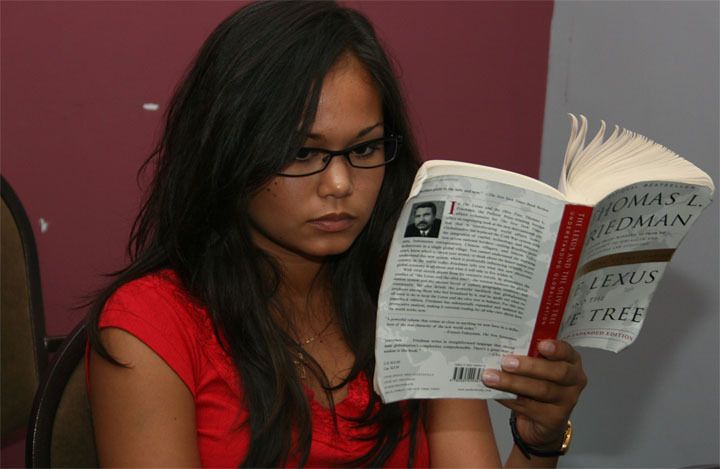If books were not political, there would be no reason to ban them.
Recent discussions among reading communities have debated the impact of politics on reading, as it is often viewed as a form of personal reflection, intellectual engagement, or leisure. However, the act of reading is deeply political. The selection of books, the narratives they contain, and how they are consumed and interpreted can reinforce, challenge, or subvert social and political structures. Books are more than just a means of escape or relaxation; they are powerful vehicles of political influence. Literature, whether intentionally or not, shapes our perception of the world. It mirrors the evils in government, society, and politics in ways that, while seemingly fabricated, are frighteningly realistic representations.
Consider “Animal Farm” or “The Hunger Games,” both popular novels that portray the written word as a battleground for ideological conflicts, provoking discussions and inspiring new thoughts. Additionally, think of “Of Mice and Men,” which exposes the illusion of the American Dream. Are we really expected to believe that John Steinbeck’s book is merely a lighthearted tale about two men, one intelligent and the other not?
Books like George Orwell’s 1984 and Aldous Huxley’s Brave New World illustrate dystopian worlds where political control and the loss of individual freedom are central themes. Orwell’s novel critiques totalitarianism and government surveillance, while Huxley’s work delves into the dangers of mass consumerism and state-sponsored pleasure. In The Handmaid’s Tale by Margaret Atwood, the oppression of women in a patriarchal society serves as a warning about the fragility of women’s rights and autonomy. Similarly, books like Beloved by Toni Morrison explore the deep scars of slavery and racial injustice, examining how history and politics shape personal identities. Works like these demonstrate how fiction not only reflects the political climates of their time but also serves as a powerful tool for resistance and social commentary.
Books that engage with political themes play a crucial role in shaping public discourse and fostering critical thinking. By addressing issues like power, inequality, oppression, and freedom, politically charged literature challenges readers to question the status quo and consider alternative perspectives. These books can expose injustices, spark movements for change, and amplify marginalized voices, offering insight into the lived experiences of those affected by societal structures. Furthermore, political books often serve as a mirror to society, reflecting both its flaws and potential for progress. In an age where information and narratives can be manipulated, books that confront political issues provide a space for dialogue and deeper understanding, encouraging readers to actively engage with the world around them and to advocate for a more just and equitable future.
I would like to highlight Khaled Hosseini’s first novel. Set against the backdrop of Afghanistan’s complex history, The Kite Runner is not only a story of personal redemption but also one that explores the politics of class, ethnicity, identity, and power. Analyzing the political undertones in the novel reveals that reading it is inherently a political act. Engaging with this novel sheds light on the complexities of Afghanistan’s socio-political landscape, the dynamics of cultural identity, and the relationship between memory and historical trauma.
The Politics of Storytelling: Representation and Power
The first political aspect of The Kite Runner is its depiction of Afghan society, which is deeply influenced by the country’s political history and socioeconomic divisions. Khaled Hosseini’s portrayal of Afghanistan in the novel illustrates how power dynamics function within the frameworks of class, ethnicity, and gender. The relationship between the two main characters—one a privileged Pashtun and the other a Hazara servant—is crucial for understanding the broader dynamics of the country. The systemic oppression of the Hazara people serves as a critical backdrop to the story. Through these characters, Hosseini highlights the entrenched ethnic and class inequalities that characterize Afghan society.
In the context of reading and interpreting The Kite Runner, the reader is invited to reflect on how power operates in society. The way one character, despite being a victim of life’s own troubles, is granted power and privilege simply by his ethnicity (Pashtun) speaks to the arbitrary nature of societal hierarchies. Conversely, other characters’ tragic fate is largely shaped by their own identity as Hazara people, an ethnic group historically marginalized in Afghanistan. The novel challenges readers to confront the uncomfortable truths about the political nature of identity and power structures, not only in Afghanistan but in broader global contexts where divisions based on ethnicity, and class persist.
Diving into this novel is far from a passive experience; it’s a captivating invitation to challenge established power dynamics and rethink how marginalized communities are portrayed in literature. Get ready to question the status quo and engage deeply with the story.
Memory, Trauma, and the Politics of Human Nature
Another important political element in the novel is the role of memory and historical trauma in shaping the characters’ lives and the nation’s collective identity. The novel is deeply concerned with the impact of Afganistan’s political history, particularly the Soviet invasion, the rise of the Taliban, and the eventual exodus of the Afghan diaspora. Hosseini’s story reflects on how individual and collective memories are shaped by political events and how history is selectively remembered or forgotten.
The protagonist Amir’s journey of redemption is intertwined with his attempts to come to terms with the personal and collective traumas of Afghanistan. His guilt over betraying his lifelong friend, a betrayal that occurs within the larger political and social context of Afghan society, depicts individuals’ actions and how they are influenced by broader political issues. Similarly, the novel’s exploration of Afghanistan’s political history highlights how trauma. Both personal and collective, have shaped the identities of its people. For example, the experience of war and the collapse of the country under the Taliban regime have profound effects on the characters who one might think are so distant from such a problem.
Books, Ideology, and Resistance
In addition, Khaled Hosseini’s The Kite Runner powerfully depicts the role of literature as a form of resistance against oppressive forces. The narrative intricately weaves themes of redemption and forgiveness, particularly through the profound journey of Amir as he grapples with his past mistakes and ultimately returns to a war-torn, Taliban-controlled Afghanistan. His mission to rescue Hassan’s son, Sohrab, is not just a personal quest but also a poignant illustration of reclaiming agency in a landscape marred by tyranny and suffering.
In this context, literature transforms into an act of defiance, serving as a vital vehicle for storytelling that counters the pervasive silence imposed by authoritarian regimes and societal injustices. Through the lens of Amir’s experiences, the novel emphasizes how narratives can empower individuals and cultivate hope, even in the darkest circumstances.
In Afghanistan, a country long subjected to various forms of political censorship, storytelling becomes a profoundly political act. The Taliban’s stringent censorship and repression of intellectual and artistic expression underscore how books and narratives serve as battlegrounds for political struggle. By recounting Amir’s emotional and moral journey, Hosseini resists the forces that seek to suppress such personal and cultural narratives.
The novel itself can be seen as a form of resistance to the erasure of Afghanistan’s complex cultural and historical identity. By telling the story of a fractured Afghanistan through the eyes of both privileged and marginalized characters, The Kite Runner provides a counter-narrative to the simplified and often demonizing portrayals of the country found in Western media. The book’s widespread success across the world has allowed it to become a vehicle for understanding Afghanistan’s humanity beyond the political headlines that often dominate discussions of the country.
Think about it: reading isn’t just a pastime—it’s a powerful act of political engagement. Every book, article, or story has the potential to shape our perspectives, challenge the status quo, and ignite change.



